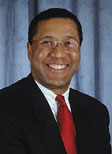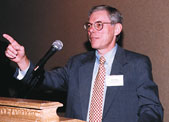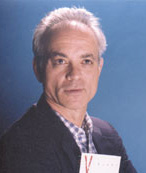 Lonnie Athens (sociology '70) thought his theory that violent criminals are the product of a four-step process would garner some attention from attorneys or judges. But after he was profiled by Pulitzer Prize-winning author Richard Rhodes in his new book, Why They Kill: The Discoveries of a Maverick Criminologist, Athens has been sought out by the media as often as by the courts. Athens' theory of criminal behavior is based on research he began as a Virginia Tech undergraduate, he says. Athens was abused as a child, grew up close to his subject matter in a crime ridden section of Richmond, and began interviewing violent criminals for his sociological research at Tech. Surprisingly, he found that these people made plans to commit violence and felt wholly responsible for their actions. Those interviews formed the foundation of his belief that serious criminals cannot blame mental health, predisposition, or environment for their actions. Athens is the author of Violent Criminal Acts and Actors and The Creation of Dangerous Violent Criminals, and his work has been used in more than a dozen capital murder cases in Virginia alone. He teaches sociology at Seton Hall University in South Orange, N.J. Back to Contents
Lonnie Athens (sociology '70) thought his theory that violent criminals are the product of a four-step process would garner some attention from attorneys or judges. But after he was profiled by Pulitzer Prize-winning author Richard Rhodes in his new book, Why They Kill: The Discoveries of a Maverick Criminologist, Athens has been sought out by the media as often as by the courts. Athens' theory of criminal behavior is based on research he began as a Virginia Tech undergraduate, he says. Athens was abused as a child, grew up close to his subject matter in a crime ridden section of Richmond, and began interviewing violent criminals for his sociological research at Tech. Surprisingly, he found that these people made plans to commit violence and felt wholly responsible for their actions. Those interviews formed the foundation of his belief that serious criminals cannot blame mental health, predisposition, or environment for their actions. Athens is the author of Violent Criminal Acts and Actors and The Creation of Dangerous Violent Criminals, and his work has been used in more than a dozen capital murder cases in Virginia alone. He teaches sociology at Seton Hall University in South Orange, N.J. Back to Contents
A group of 11 theatre arts graduates from Virginia Tech are making a name for themselves in Chicago as TriArts, Inc., the only non-profit arts organization in that region owned and operated by Tech alumni. TriArts consists of three parts: the Adult Swim Ensemble, comprised of performers, writers, and directors; a design studio working with lights, sound, set, and costumes; and a workshop for set and special effects. TriArts was founded by John Rogers (theatre arts '95), Troy Fujimura (theatre arts '96), and Brian Loevner (theatre arts '94), who were roommates while at Tech. Loevner says Chicago is a theatre friendly city where artists can be successful. In July, TriArts will perform a yet untitled original comedy directed by Noel Williams (theatre arts '97), who studied commedia in Italy. TriArts hopes to offer internships to Tech theatre arts majors twice a year. Back to Contents
Jazz guitarist Charlie Byrd dies 
Renowned jazz guitarist and former Virginia Tech student Charlie Byrd died Nov. 30 of cancer. Byrd, who recorded more than 100 albums in five decades, came to Virginia Tech in 1942 in an accelerated war-time program to get a chance to play in the university's Southern Colonels orchestra. "I had never played with such a good band," he said of the student group. Byrd was drafted into the U.S. Army after just five quarters at Virginia Tech. When the war ended, Byrd studied classical guitar at the Harnett National Music School with such notables as Sophocles Papas and Andres Segovia. He studied Latin American music in South America and made an album with Stan Getz that gained credit for the bossa nova craze in this country. Byrd performed with many notables, including the Boston Symphony Orchestra with Arthur Fiedler conducting. He also owned and performed at the Showboat Lounge, a jazz landmark in Washington, D.C. He performed with the Charlie Byrd Trio, in which his brother, Joe, played bass. Back to Contents
Larry Terry (public administration Ph.D. '86) was elected a Fellow in the National Academy of Public Administration. Fellows in this organization provide expert advice to governmental leaders at all levels. Terry was inducted in a class that included the governor of Maryland and the chief financial officer of the Federal Deposit Insurance Corp., among others. Currently a professor at Cleveland State University, Terry is also the youngest and first African-American editor-in-chief of the Public Administration Review. "There is nothing more important than public service to maintain and preserve democracy," he says. Back to Contents
Alumna's signs recognized as fine art 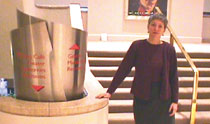
Visitors to the Virginia Museum of Fine Arts might not realize that the signs they read in the lobby qualify as part of the exhibit, but a prestigious international art publication does. The 29th Creativity Annual, a book showcasing the best in innovative design, will feature photographs of two dynamic signs designed by Kennah Harcum (architecture '78). The signs are five-foot, stainless-steel spirals nestled behind a low wall leading to the staircase of the museum lobby. "I had to put information at a point of decision. We needed an architecture element to become part of the building, not just a sign to stand there," says Harcum, who is a specialist in way-finding. The spiral signs work into the sweeping curves of the stairway, imparting the necessary information to visitors. About 1,300 of the more than 7,500 entries to the Creative Annual are displayed in the book. Back to Contents
Billy Edge (civil engineering '64, M.S.) was named a Fellow in the American Society of Civil Engineers, one of the highest professional recognitions civil engineers can receive from their peers. The society also honored Edge with a major individual award, the John G. Moffett and Frankie Nicole Harbor and Coastal Engineering Award, for significant contributions to coastal and harbor engineering. Edge has made preserving beaches and improving coastal water quality his life's work. "Every time I go to a beach, it's a new beach. The shore is dynamic, " Edge says. His mission is imparting that knowledge to students as head of the ocean engineering program at Texas A&M University. Back to Contents
When Deborah Bennett D'Andrea (psychology '82) left her job as school psychologist and educational specialist to found a children's book company, she didn't expect her path to be all sweetness and light. But sweet it is. Last year her Nibble Me Books line received Product of the Year honors from Professional Candy Buyer Magazine during the unveiling of the Candy Hall of Fame exhibit in Hershey, Pa. Her company creates interactive books for children using confections to add interest to the stories. The books are now distributed through Wal-Mart, Target, and K-Mart stores and include such titles as Jelly Belly Princess and Peanut Butter and Worms. D'Andrea and her husband began their publishing careers with Picture Me Books, a line of interactive books featuring the book owner's photo in many career and sports settings. They have created more than 100 books on topics from career choices to fairy tales to religious themes. The line earned the National Parenting Seal of Approval in 1998. Back to Contents
Martin named to top post at Winston-Salem State 
Harold L. Martin (electrical engineering Ph.D. '80) was named chancellor of Winston-Salem State University though the 2001-02 academic year. He took office Jan. 3. Martin has been credited with strengthening collaborative partnerships and raising the quality of academic programs as vice chancellor at North Carolina A&T State University. He holds undergraduate and master's degrees in electrical engineering from A&T and has been a member of the faculty since 1980. Martin served as electrical engineering department chairman and dean of engineering before being named vice chancellor for academic affairs in 1994. In announcing Martin's appointment, UNC system President Molly Broad said: "Dr. Martin's extensive experience, integrity, and sound judgment make him well-qualified to provide strong leadership for Winston-Salem State during a critical change." Back to Contents
Lewis named community college president 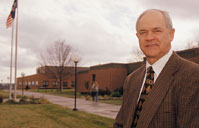
Jack Lewis (Ed.D. '76) is focusing on adapting technology to the curriculum at New River Community College in Dublin, Va., where he was promoted to president Jan. 1. "I want to release people to take risks adapting technology to the curriculum. It's the most powerful tool we have," he says. Lewis became data processing manager at the community college while working on his graduate degree at Tech and served as dean of management services, dean of instruction and student services, and dean of the college. During those years, the college expanded its efforts to teach high-tech applications, so that it now "exceeds the technology base at any community college in the nation," he says. Back to Contents
Classmates reunite as NAE Fellows 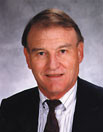
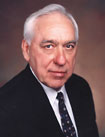
Terry Alfriend (engineering mechanics '62, Ph.D.) and Martin Mikulas (engineering mechanics '61, M.S., Ph.D.), friends from their Tech undergraduate years, found themselves standing together again as they were named last year to the National Academy of Engineering, one of the highest honors an engineer can receive. Alfriend worked for the Navy, pioneering methods of controlling the orbit of satellites, and is now head of the aerospace engineering department at Texas A&M University. Mikulas worked for NASA for 30 years and developed theories for constructing the shell material used on the Saturn V rocket and the Space Shuttle. Back to Contents
Home | News | Features | Philanthropy | Alumni | Classnotes | Editor's Page

